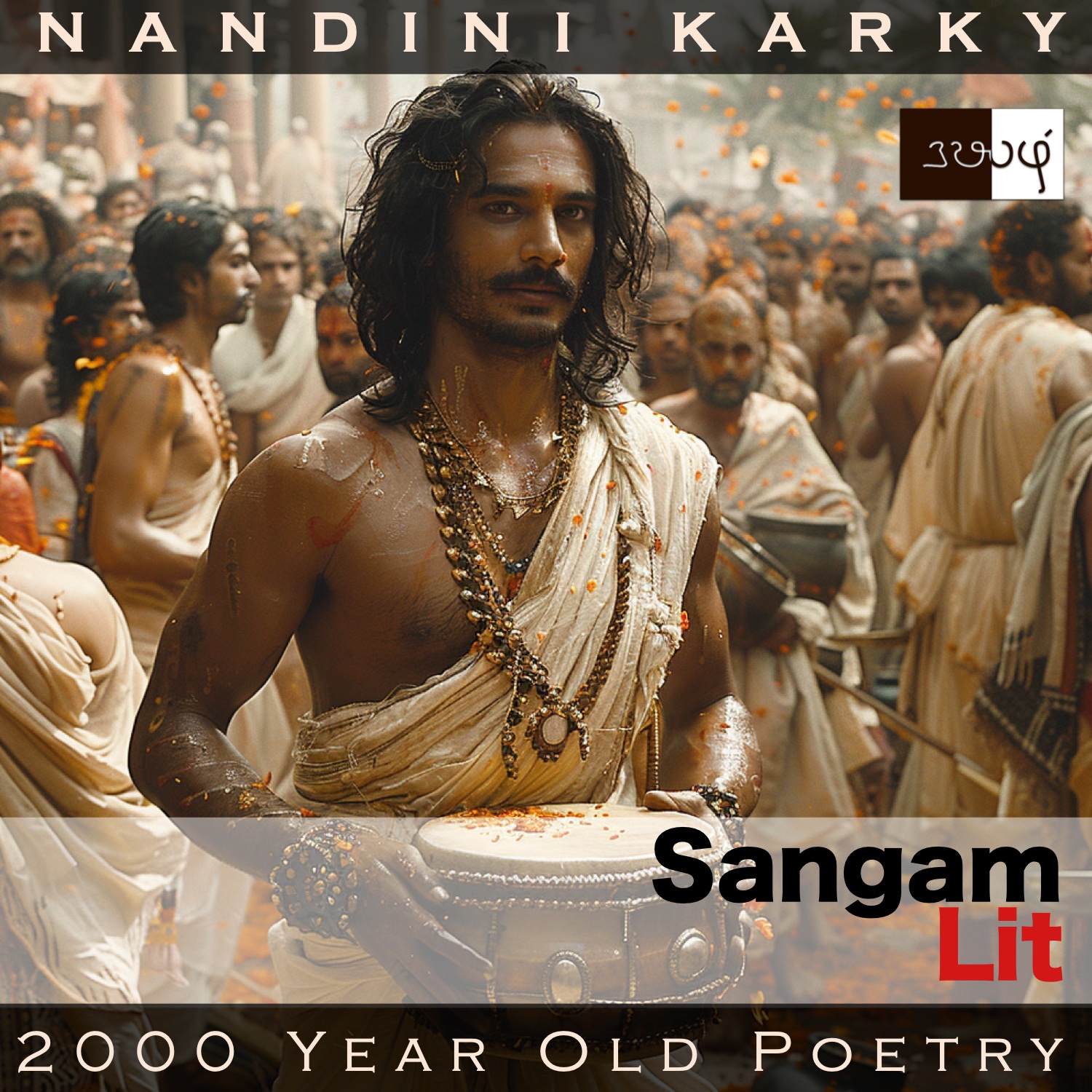Podcast: Play in new window | Download
Subscribe: Apple Podcasts | Spotify | Amazon Music | Android | iHeartRadio | TuneIn | RSS | More
In this episode, we listen to the fame and glory of a king, as depicted in Sangam Literary work, Puranaanooru 377, penned for the Chozha King Rasasooyam Vetta Perunar Killi by the poet Ulochanaar. The verse is situated in the category of ‘Paadaan Thinai’ or ‘Praise’ and sketches a poet’s awe in seeing a patron’s kindness.

பனி பழுநிய பல் யாமத்துப்
பாறு தலை மயிர் நனைய,
இனிது துஞ்சும் திரு நகர் வரைப்பின்,
இனையல் அகற்ற, என் கிணை தொடாக் குறுகி,
‘அவி உணவினோர் புறங்காப்ப,
அற நெஞ்சத்தோன் வாழ நாள்’ என்று,
அதற் கொண்டு வரல் ஏத்தி,
‘கரவு இல்லாக் கவி வண் கையான்,
வாழ்க!’ எனப் ‘பெயர் பெற்றோர்
பிறர்க்கு உவமம் தான் அல்லது,
தனக்கு உவமம் பிறர் இல்’ என,
அது நினைந்து, மதி மழுகி,
ஆங்கு நின்ற எற் காணூஉச்
‘சேய் நாட்டுச் செல் கிணைஞனை!
நீ புரவலை, எமக்கு’ என்ன,
மலை பயந்த மணியும், கடறு பயந்த பொன்னும்,
கடல் பயந்த கதிர் முத்தமும்,
வேறு பட்ட உடையும், சேறுபட்ட தசும்பும்,
கனவில் கண்டாங்கு, வருந்தாது நிற்ப,
நனவின் நல்கியோன், நசைசால் தோன்றல்;
நாடு என மொழிவோர், ‘அவன் நாடு’ என மொழிவோர்;
வேந்து என மொழிவோர், ‘அவன் வேந்து’ என மொழிவோர்;
புகர் நுதல் அவிர் பொற் கோட்டு யானையர்,
கவர் பரிக் கச்சை நல் மான்,
வடி மணி, வாங்கு உருள,
கொடி மிசை நல் தேர்க் குழுவினர்,
கதழ் இசை வன்கணினர்,
வாளின் வாழ்நர், ஆர்வமொடு ஈண்டி,
கடல் ஒலி கொண்ட தானை
அடல் வெங் குருசில்! மன்னிய நெடிதே!
The interesting facet about this song is that it’s full of dialogues within! The poet’s words to this Chozha King can be translated as follows:
“Crossing many nights, as the pouring dew drenched my unkempt hair, hoping to end my poverty, I arrived at the gates of the wealthy palace that seemed to rest pleasantly, beating my ‘Kinai’ drum and sang, ‘Protected by those who eat sacrificial offerings, may this man with a just heart live for long’. Just then, he was welcoming others who came singing his praises, saying, ‘May the one with generous hands, which know not to hide wealth but only to give ceaselessly, prosper’, ‘He is the one who becomes a simile for the great and famous but there’s no one who can be a simile unto him’. Reflecting on these words, I stood there, dazed. Seeing me lost in thought, saying, “O Kinai drummer, who seems to be going to far-away lands! You are now under my protection’, he rendered gems from the mountains, gold from the forests, and shining pearls from the seas, a variety of clothes, pots brimming with liquor, as if I was seeing all this in a dream. But he was giving it for real, removing every shred of my sorrow, that kind and smiling scion!
Those who think about countries will declare, ‘His is the only great country’; Those who think about kings will declare, ‘He is the only great king’; Those owning elephants wearing golden ornaments on their spotted foreheads; those riding speedy horses wearing saddles; those wielding fine chariots with fluttering flags, rolling wheels and ringing bells; agile and famous men with strong eyes, who live by the sword; They all gather around the king with eagerness. May the lord, with such an army, roaring like the ocean, who desires battles, live for long victoriously!”
Let’s explore the details. The poet first talks about how the pouring dew of many nights past had tamed his rough and unkempt hair, reminding us of the words of another poet in Puranaanooru 374. He continues by saying he reached the gates of this king’s huge palace, which was sleeping peacefully. He has come there, playing on his ‘Kinai’ drum, blessing the righteous king with a long life, one that is protected by those who received cooked food as offerings. Some have interpreted this reference as if the poet is talking about gods, but deriving from other poems, he may be referring to ancestors as well. Returning, all around him, he hears praises for the king saying he’s renowned for his ceaseless generosity, and that he knows not to hide or hoard his wealth for himself, and also, how he can be a reference for every great and famous person, but there is no one at all who can be this king’s equal. As the poet was standing there, awestruck by these praises of others, the king sees him and welcomes him declaring that this poet was under his protection.
Not just words, but the king offers everything the poet has ever wanted, like precious gems that came from the mountains of his domain, gold that was mined in his forests and pearls obtained from his seas, as well as practical items like a plethora of clothes, and most importantly, toddy for the tummy! For a moment, to the poet, everything seems like a dream. But then, he realises, ‘No, this is real and the king is standing right there and ending my sorrow!’ He decides the king’s country is the only true country and this ruler is the only one worthy of the title of ‘king’. He goes on to say how around the king stands a huge army, filled with those riding grand elephants, speedy horses, sturdy chariots as well as swordsmen known for their strength and courage. Wishing the king to live a long and famous life, the poet concludes. To me, the key facet of this verse is how the king makes the poet’s dream a reality with his compassion, and after all these thousands of years, we can still relate to the joyous feeling that arises out of such a moment, when our heart’s desires are fulfilled!




Share your thoughts...